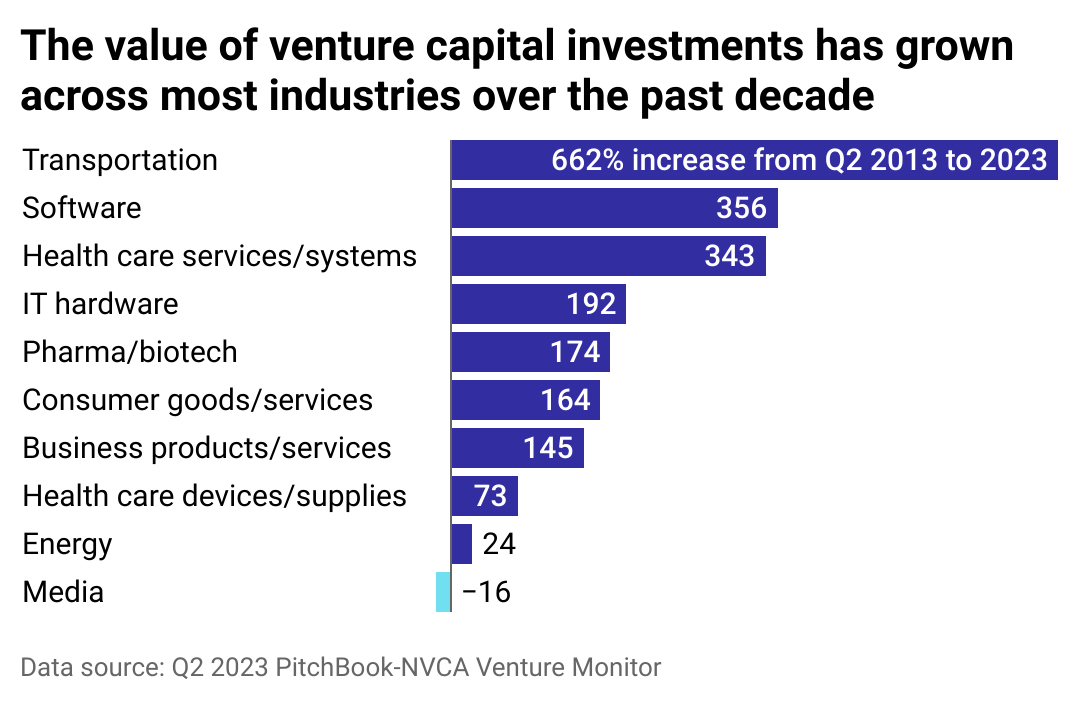While the startup landscape continues suffering distress caused by economic apprehension, aftereffects of bank breakdowns, and expected interest rate increases, venture capitalists still hope their funding will help drive innovation around the world. That's according to PitchBook, which revealed its Q2 2023 Venture Monitor report in July, along with the National Venture Capital Association.
Venture capital investments dropped 34% from the first quarter to the second quarter of 2023. However, PitchBook analysts believe such contractions often make room for a new round of big ideas, many boosted by venture capital investments. PitchBook's report highlights that startups in the life sciences and artificial intelligence industries present significant opportunities even in stressful economic conditions.
FREE INVOICE GENERATOR
Stretch your limited funding as far as possible with Bonsai’s free invoice generator. Whether you’re a small business, agency, or freelancer, Bonsai helps you win clients, organize products, and get paid.
Venture capital is when wealthy people or companies purchase shares of businesses or startups that generally do not have access to other sources of financing. Usually, companies seeking VC funding say they have high long-term growth potential and innovative products or services.
VC often comes in the early stages of a business—before it has anything to sell or any money coming in from sales. Nonetheless, sometimes the money can come even earlier to help entrepreneurs turn their idea into a business plan and launch a minimum viable product. That's called "pre-seed funding." ("Seed funding" can come in to help a company launch its first product before there is any revenue at all.) Companies may also solicit or accept VC in later stages of development when seeking to expand marketing to drive sales, boost production to meet demand, shift an existing product's intended audience, or launch new products or services.
After a startup requests an investment, the venture capital firm will conduct "due diligence"—a thorough review of financial records, past performance, professional experience of key executives, and any other information that can help determine the startup's growth potential. If the funder likes what it sees, the money will follow. The investors also usually play an active role in the company's decision-making while providing managerial and technical support.
Understanding the playing field
Not many years ago, venture capitalists, who seek to get involved in companies they invest in, and angel investors, who provide startups with initial seed money without getting deeply involved, were considered similar. The differences between them have heightened as the tech industry has merged with other industries to birth new products, services, and business models.
In general, angel investors are usually wealthy people who seek minimal leadership roles and will provide up to $1 million in exchange for 20% to 30% of a company's equity. VC most often comes from institutional investors in partnerships who are collectively willing to invest more than $1 million, usually in exchange for 25%-50% ownership.
Knowing the requirements to qualify to receive VC is crucial for entrepreneurs, new businesses, or creative people looking to launch or expand a business endeavor. So is keeping track of market trends in each industry funded by VC and other private equity investments. It's also useful to know how venture capitalists make decisions, how they find prospective investments, and, even more importantly, how they choose which companies get their money.
Bonsai measured the percent change in venture capital dollars invested across startup sectors, using data from the Q2 2023 PitchBook-NVCA Venture Monitor report. Change is measured from the second quarter of 2013 to the second quarter of 2023.

Bonsai
Transportation, software startups have grown VC funding most over the past decade
The transportation industry has shown a solid growth of 662% in the last decade, partially thanks to mega-successful VC-funded ride-hailing companies, such as Uber or Lyft, and a rising interest in developing groundbreaking delivery systems for giant retailers like Walmart or Amazon.
It comes as no surprise that software development startups have been a top-three investment choice for venture capitalists for decades. Apple, Facebook, Google, Intel, and Microsoft were all powered by VC funds at different points in their successful histories. Insider Intelligence reported $121.2 billion in venture capital investments in software startups in 2021 alone. In the last 10 years, the value of VC in the industry has grown 356%.
The health care industry is just barely behind software, with a 343% growth. Key drivers are information technology tools and software designed to magnify productivity and improve service quality at every level of a patient's experience in medical practices, hospitals, day clinics, and pharmacies. Despite all that work, the need for even more innovation in health care was widely exposed during the COVID-19 pandemic.
Since then, health care technology—known as "health tech"—boosted its efforts to improve efficiency by tailoring services to each patient's needs. Whether they're looking at people's diets and sleep patterns or medical practices' billing problems, health tech innovators hope to make money by easing the strain on the industry and its workers.
Story editing by Jeff Inglis. Copy editing by Paris Close. Photo selection by Michael Flocker.







